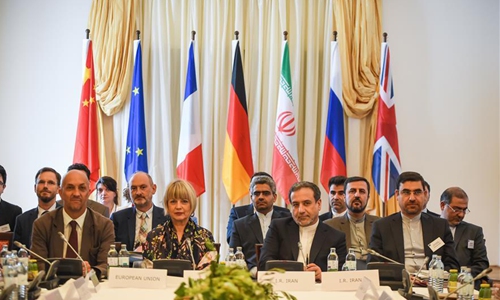HOME >> WORLD
UK, France reiterate commitment to upholding Iran nuclear deal
Source:Xinhua Published: 2020/1/20 13:48:59

Delegates attend a meeting of the Joint Commission of the Joint Comprehensive Plan of Action (JCPOA) in Vienna, Austria, on July 28, 2019. The remaining Iran nuclear deal signatories reaffirmed their commitment to the Joint Comprehensive Plan of Action (JCPOA) and criticized the United States for its unilateral sanctions during a meeting here Sunday, according to Chinese delegate Fu Cong, director general of the Department of Arms Control at the Chinese Foreign Ministry. Photo:Xinhua
Britain and France on Sunday reaffirmed their commitment to the Iran nuclear deal while acknowledging the need to define a long-term framework to prevent Iran from acquiring a nuclear weapon, said a Downing Street spokesperson.
British Prime Minister Boris Johnson and French President Emmanuel Macron made the remarks during a meeting on the margins of the Berlin conference on Libya.
"They agreed on the importance of de-escalation and of working with international partners to find a diplomatic way through the current tensions," the spokesperson said.
France, Britain and Germany said Tuesday that they have triggered the dispute mechanism set up in the 2015 Joint Comprehensive Plan of Action (JCPOA) with the hope to preserve the nuclear deal and bring Iran back into full compliance with its commitments.
Iran, however, said its withdrawal from practical commitments under the JCPOA is a reaction to the U.S. exit from the deal in May 2018 and the subsequent sanctions, and also a response to Europe's sluggishness in facilitating Iran's banking transactions and its oil exports.
"Britain, France and Germany, three parties to the Iranian deal, claim that Europe has kept its obligations under JCPOA, however, in reality, they have not imported Iran's oil and have not facilitated Iran's international banking actions," Iranian Foreign Minister Mohammad Javad Zarif tweeted Thursday.
Meanwhile on Libya, the spokesperson said Johnson and Macron also discussed the ongoing conflict in the war-torn country.
Johnson stressed the need to bring an end to the fighting and for all parties to support peace talks to determine a way forward for the Libyan people, said the spokesperson.
Gathering envoys from the United States, Russia, Britain, France and China, among others, the Berlin conference on Libya was called after warring sides in Libya -- the UN-backed Government of National Accord and the Libyan National Army -- failed to reach a deal in Moscow.